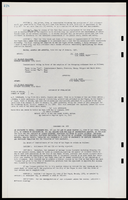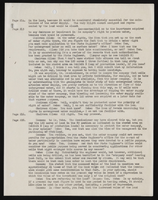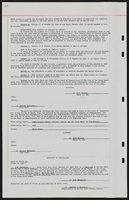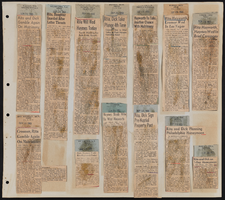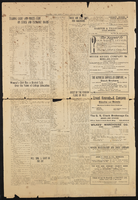Search the Special Collections and Archives Portal
Search Results

Meeting minutes for Consolidated Student Senate, University of Nevada, Las Vegas, September 5, 1978
Date
Archival Collection
Description
Text

Sonia Rivelli Jiavis oral history interview: transcript
Date
Archival Collection
Description
Oral history interview with Sonia Rivelli Jiavis conducted by Nathalie Martinez and Barbara Tabach on March 6, 2019 for the Latinx Voices of Southern Nevada Oral History Project. In this interview, Rivelli discusses her life including the evolution of her cultural background and her role in business. She describes how her parents moved to Brazil from Italy and how she has come to value her cultural roots in Brazil, Italy, and the United States. She mentions that travel was a major part of her life and that she has been to North America, South America, and Europe. One of Rivelli's accomplishments in her career was helping the development of the Brazilian community in Las Vegas, Nevada. She also states that she created the Aqua Diva Global water purification company in hopes of providing more safe and clean water to all people.
Text

Transcript of interview with Don Eckert by Robert A. Kamp, March 15, 1981
Date
Archival Collection
Description
On March 15, 1981, Robert A. Kamp interviewed Donald (Don) L. Eckert (born 1953 in Las Vegas, Nevada) about his experiences while living in Nevada. Eckert first explains the geographical boundaries of Las Vegas when he was first born and the types of recreation in which both youth and adults would take part. Eckert then discusses the Helldorado events and how they have changed over the years before describing how the University of Nevada, Las Vegas has changed as well. The interview then shifts to the topic of Eckert’s college major, hotel management, and then to a brief discussion about the MGM fire. Eckert also talks about horse racing in Las Vegas, changes in gaming, the Basic Magnesium plant, and the development of Mount Charleston. The interview concludes with Eckert’s thoughts on the legalization of gambling in other states and how that trend relates to the future of Las Vegas.
Text

Interview with Robert Hahn, October 29, 2004
Date
Archival Collection
Description
Text

Interview with Benjamin Clinton Diven, March 10, 2004
Date
Archival Collection
Description
Text

